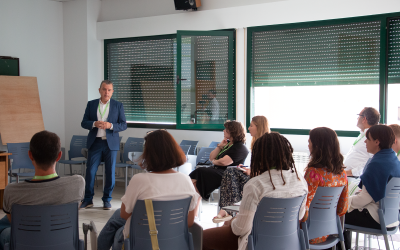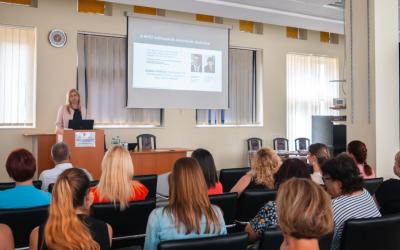
An interview with Zuzana Limova-director of the film Before I Met You
The guest at the first day of 2018 Human Rights Film Festival in Zagreb was Zuzana Limova, journalist and director whose degree project, the film Before I Met You (Medzi nami), was banned right after it was made. The film shows the grim reality of giving birth in Slovakia and the thoughts and feelings of the director herself and mothers who were followed during the film making.
In the midst of public debate following a speech by Croatian MP Ivana Nincevic Lesandric about her painful experience of a surgical miscarriage procedure carried out without anaesthesia, Croatian Public TV’s documentary department, said it would not show the film because “... it is not a constructive contribution to the problems which modern healthcare systems have.”
This refusal raises a number of questions. Instead of expecting a ‘constructive contribution’ shouldn’t the criterium to broadcast a documentary be its relevance? Why are documentaries made if not to bring to light injustice in the hope of affecting change? When would the impact of a documentary be more relevant than during public debate on the very same subject? Shouldn’t ‘constructive contribution’ be expected there where it can happen: in the structures of the system designed to care for women and newborns?
Zuzana Limova, journalist and film director from Bratislava can be seen and heard in the film. She speaks gently, tells about her experience and her feelings in a caring manner, without judgement, stating the obvious but showing concern there where most wave their hand in ignorance. Or is it impotence? Don’t we all wish our mothers, daughters, friends and family were cared for in the best way possible? When we feel we cannot change the system, does that mean we have to adapt to it? Or is adapting a survival mechanism?
We interviewed Zuzana, who pleads for dignity and kindness for our mothers and babies during their most vulnerable times. By the reception her film has had it seems that kindness is forbidden.
Your film Before I Met You has been screened to small audiences last year in Croatia and is part of the programme of the Human Rights Film Festival which takes place in Zagreb and Rijeka in the week dedicated to human rights. What are your impressions of Croatia now that you've been here more than once?
Although we have already screened our documentary in different countries, I clearly remember the Croatian premiere. Usually I wait outside the cinema, until the film gets screened and only then I come back for the Q&A. In Zagreb I decided to watch the film with the audience, because I was curious to see their reactions. I was impressed, all women breathed, laughed and cried in the same rhythm, during similar scenes... as in Slovakia and elsewhere.
If the film gets understood in different cultures, it is a great compliment for a film-maker. But in case of our film, it also means that thousands of women around the world have the same, traumatising experiences from the - so called - happiest moment of human's life. Our film often brings back their own memories.
The film is your degree project at Zelig, a school of documentary film in Italy. You filmed it after your daughter was born. Why a film about birth?
Honestly, I would prefer this film was never made - simply because its theme didn't exist. We made this documentary to create a safe space for women to share their stories and to capture the conditions in which we bring our children to the world.
How did you decide to give birth in Slovakia?
I think I did my “pre-delivery” homework well, I visited 5 hospitals in 4 countries to choose the right one. Many women in Slovakia “migrate” to deliver in the close-by countries to experience more respectful and up-to-date care. In the end my preparations didn't matter, I was unexpectedly hospitalised in Slovakia, as our daughter was born one month premature.
Suddenly I had found myself in one of the biggest Slovak hospitals, facing the closed universe of very old-fashioned healthcare system, which has totally different rules than the outside world. I was shocked and though to myself: “No-one will ever believe me that something like this still exists. Someone should make a film about it.” Anyway, I never imagined it would be me, making the film.
Was it difficult to get the medical staff to work with you?
We were lucky to receive the permission to film in the University Hospital in Bratislava, where future doctors, midwives and nurses get trained. We agreed to be respectful and invisible - neither disturb the medical staff, nor distract the women in labour. Of course, not everyone was happy for having us at his workplace, but most personnel enjoyed sharing their daily routine with us.
Unfortunately, after the film was finished the hospital tried to stop its distribution (and they almost succeeded, the film was banned and it took 9 months to screen it in Slovakia), we even had to face threats and discrediting campaign, during which my and my daughter's medical reports were misused.
How were the reactions to the film in Slovakia and in the rest of the world? Did you get support for the film and your ideas and where?
As a result of threats from the hospital we filmed in, our film was blocked for (symbolic) 9 months before we managed to screen it in Slovakia. Shortly after its release last autumn, the film caused a national scandal. It was covered by most important media and opened a wide public discussion on women's rights in childbirth. The only exception was the public broadcaster, which censored the information about the film.
Thanks to public pressure, the Ministry of Health announced new policy of positive changes that will be implemented in Slovak hospitals. For example, the fees for accompanying persons and pain release have been already cancelled, but unfortunately only in public hospitals. Unfortunately, for women from regions with private healthcare providers is this unsystematic decision still discriminatory.
What we are most proud of is that our film has given voice to hundreds if not thousands of women and men with similar traumatic experiences from maternity wards in Slovakia and abroad. So far, the film has been screened around Europe, as well as in South Africa and Mexico.
How important is it to share experiences?
Usually the childbirth is seen as a “female” topic, but it is not. The consequences of wrong practice in maternity care are far-reaching and society pays a steep cost for them. The emotional state and physical health, which women leave the maternity wards in, affect their ability to take care of their baby, to maintain relations, to work, to have sex with their partners. Not talking about the fact that each of us was born and is influenced by the way it happened. Therefore speaking up and sharing experience is incredibly important. Only problems we speak about might be sorted out. And sharing also means healing.
You know that Croatian television refused to air the film stating: "...it is not a constructive contribution to the problems which modern healthcare systems have". What do you think about that?
It is true that “modern" healthcare systems in post-communist countries don't see the conditions in which women give birth as a problem. Behind the closed doors of delivery rooms the old-fashioned procedures and different forms of violence are conserved better than in a museum. Does “modern” society care about women who suffer after needless episiotomies? Are we worried about children who won't be able to build healthy relations because after birth they were separated from their mother? I'm not sure.
Nowadays in Croatia we are witnessing that those who speak their truth are seen as troublemakers and are bullied and silenced. Their efforts to change the medical and societal norms are compared to losing dignity. We have seen this happen to a member of the Croatian Parliament Ivana Nincevic-Lesandric after she spoke about disrespectful care she experienced in a public hospital. Why do you think women’s voices remain unheard and the victims of obstetric violence are often blamed for what has happened to them?
It's been some 70 years since women started to give birth in the hospitals. It means there are already a few generations of those who left the maternity wards with traumatising memories and/or long-term health issues, as a result of wrong practise. Denying the experiences of women and accepting obstetric violence as normal is the way, how society deals with collective trauma. It is a natural reaction to abnormal consequences. For a society that has been harmed for so long, it is easier to “kill the messenger” than to accept “bad news”. Because the truth hurts.
How did you feel when you were attacked publicly after the release of the film?
We didn't expect that our film will be welcomed by every single viewer, but we hoped we will create an occasion to a public discussion on how the system can be changed to be more respectful for women and their children and also more dignified for medical staff, which often works in very inhumane work conditions. Instead of it, I had to face threats, scurrilous messages, discrediting campaign, … What can I say? It was an incredibly difficult period which has had a long-term effects on my health and the wellbeing of our family. But I'm not going to give up (yet).
You say that you have become an activist after making the film. What changes would you want to see? What is the role of film in the process of changing society?
The film Before I Met You hasn't shown anything new. The human rights organisations have documented thousands of women's stories and kept urging the ministry of health to change the reality in Slovak maternity wards. But it was only after our premiere that the maternity care become the topic of entire society. It is the power of moving picture - to open public discussion and eventually “change the world”.
Unfortunately, the positive changes I would like to see in Slovak maternity wards are coming slowly, if ever. It is a shame that still in 21st century women give birth in undignified conditions, face violence in delivery rooms, that in Slovakia we still don't have obstetric guidelines and women's voices remain unheard.
I wish our daughters will have a chance to bring their children to the world where, how and with whom they choose, unlike us. That's why I keep on traveling with the film and giving talks on respectful maternity care.
Who do you think would have to see the film and what would you want them to learn from it?
Everyone who was born. Why? To understand that birth is not just a single day of life to be survived and forgotten.
Do you have a message for those who have suffered violence during medical procedures?
It wasn't your fault. It is the medical staff's responsibility to provide respectful healthcare. It is the state's duty to educate the medical staff about the best practice and to protect your right to give a dignified birth. You did nothing wrong. Forgive yourself.












